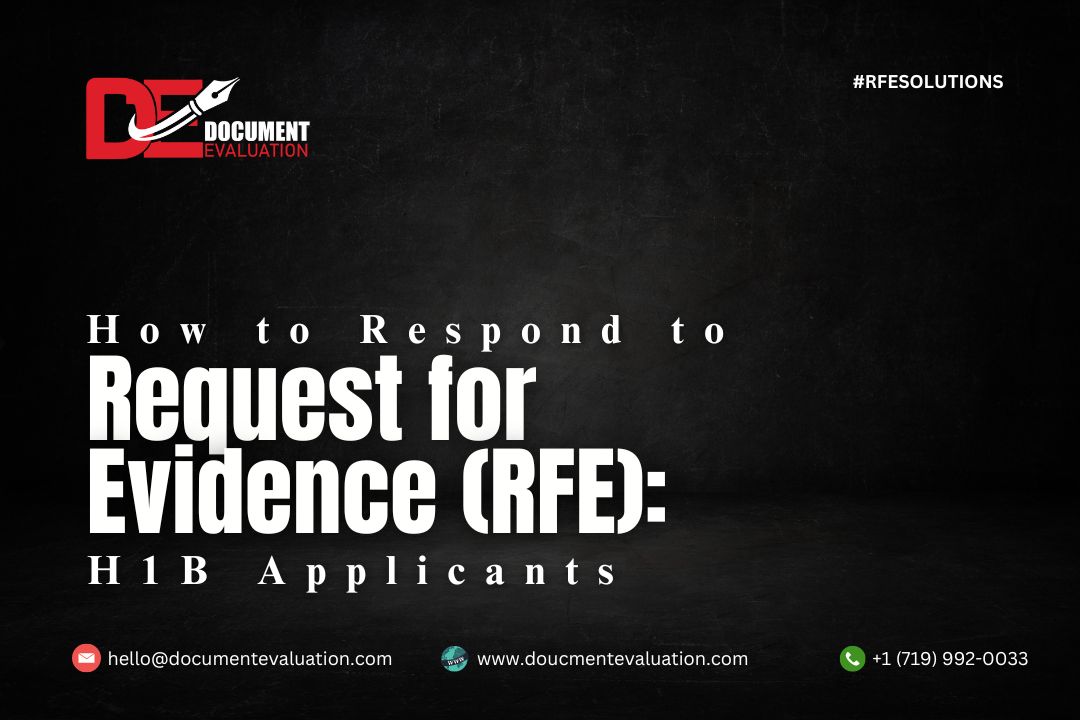Receiving a Request for Evidence (RFE) from the United States Citizenship and Immigration Services (USCIS) can be daunting, especially if you are in the process of obtaining an H1B visa. However, an RFE is not a denial; rather, it’s a request for additional information to clarify or strengthen your visa petition.
In this guide, we’ll explore what an RFE is, how to handle it, the documents you might need, and how expert opinion letters can play a critical role in ensuring your application moves forward. If you’re prepared and organized, you can respond effectively and continue with your application smoothly.
What is a Request for Evidence (RFE)?
A Request for Evidence (RFE) is a formal notice issued by USCIS when the evidence you provided in your initial visa application is insufficient or unclear. It’s important to note that receiving an RFE does not mean your visa has been denied; it’s simply a request for more documentation or clarification before making a final decision.
For H1B visa applicants, RFEs are commonly issued for reasons such as:
- Insufficient evidence of qualifications for the job role.
- Questions regarding the employer-employee relationship.
- Clarifications about the beneficiary’s qualifications.
Knowing how to respond RFE and effectively can make a significant difference in the outcome of your application.
How to Respond to a Request for Evidence (RFE)
Here are the steps to ensure your RFE response is strong and accurate:
1. Carefully Review the RFE
The first step is to thoroughly read through the RFE. USCIS will outline exactly what additional information or evidence is needed. Make a checklist to ensure you gather all the documents they’re asking for, such as academic credentials, work experience documentation, or job descriptions.
2. Collect the Required Documents
After reviewing the RFE, start collecting the necessary documentation. Some common items you may need to provide include:
- Degree certificates or diplomas
- Work experience evaluations
- Updated job offer letters or employment contracts
- Expert opinion letters to validate your credentials or specific expertise
At Document Evaluation, we specialize in preparing detailed work experience evaluations and expert opinion letters to help clarify and validate your credentials in response to an RFE.
3. Prepare a Strong RFE Response Letter
A well-written response letter is essential. In your letter, address each point raised in the RFE, providing clear and direct answers. Attach the necessary documents with a cover letter summarizing the evidence you are submitting and explaining how it addresses the issues raised by USCIS.
4. Submit Before the Deadline
Make sure you have enough time to gather the required documents, write your response, and submit everything before the deadline. USCIS typically provides a specific timeline by which you must submit your RFE response, often within 30 to 90 days. Missing this deadline could result in the denial of your application.
How Can an Expert Opinion Letter Help?
An expert opinion letter is one of the most valuable tools in responding to an RFE, especially when USCIS questions your qualifications or work experience for the H1B job role. These letters are written by recognized experts in your field and provide professional validation of your skills, credentials, and expertise.
For example, if USCIS questions whether your foreign degree matches the requirements for the job role, an expert opinion letter can clarify how your degree and work experience align with U.S. standards. This can be particularly helpful for those applying for specialized roles in fields like IT, engineering, or healthcare.
At Document Evaluation, we provide expert opinion letters from qualified professionals that help bridge the gap between your foreign qualifications and USCIS requirements.
Avoiding RFEs in Future Visa Applications
While responding to an RFE is manageable, it’s always better to avoid RFE’s one in the first place. Here are a few tips to reduce your chances of receiving an RFE:
- Provide comprehensive documentation upfront, including educational credentials, detailed job descriptions, and employment contracts.
- Work with professional services like Document Evaluation to ensure your work experience and qualifications are clearly documented and evaluated.
- Double-check your application before submitting it to USCIS to ensure that no important details are missing.
Common Reasons for RFEs in H1B Applications
H1B visa applicants can receive RFEs for a variety of reasons. Some of the most common reasons include:
- Unclear job roles: USCIS may request further evidence to prove that the job qualifies as a specialty occupation.
- Insufficient evidence of qualifications: If USCIS believes your educational background does not meet the requirements for the job, they may request additional academic or work experience documentation.
- Issues with the employer-employee relationship: USCIS may seek clarification on whether a legitimate employer-employee relationship exists, particularly for consulting positions where employees may work off-site.
Being aware of these common reasons can help you prepare a stronger application and avoid delays caused by RFEs.
Conclusion
Receiving a Request for Evidence (RFE) can seem overwhelming, but it’s a normal part of the immigration process, especially for H1B applicants. By understanding the RFE process, carefully collecting and submitting the required documents, and utilizing tools like expert opinion letters, you can improve your chances of success.
If you need help with your RFE response, consider working with professionals like Document Evaluation to ensure your application is as strong as possible. Our expert services, including work experience evaluations and expert opinion letters, are designed to help you navigate the complexities of the immigration process with confidence.




Olen
November 8, 2025whoah this weblog is magnificent i really like reading your posts.Keep up the great work!